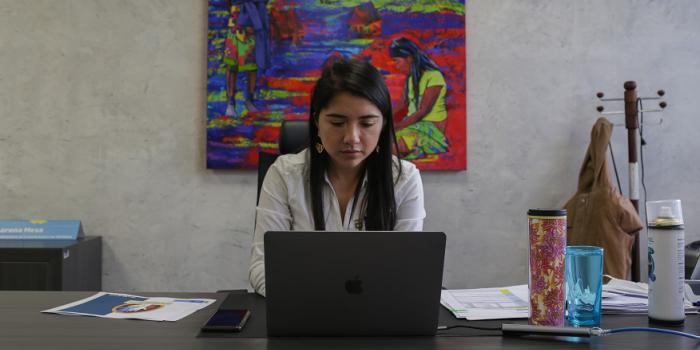
Victims of La Guajira ask to prioritize returns, Collective reparations and humanitarian aid
This was stated on the first virtual day of the "Great dialogue with the victims of conflict in the time of Covid-19", after requesting the Unit to reform the stratification system for institutional supply and greater access to housing.

Different members of the Table of Victims of La Guajira, agreed to request the Unit to give priority to sensitive issues such as returns, reparations collectivas and humanitarian aid, especially in the rural sector, at the request of the first virtual session of the “Great dialogue with victims in the time of Covid-19”.
The delegates of the aforementioned departmental table, also made proposals to the Unit managers, related to modifications to the current model to stratify them and access the institutional offer; with giving priority to possible housing programs, mobilizing institutional offerings to all the municipalities of the department and recognizing indigenous and Afro populations as collective subjects.
The director Ramón Rodríguez, made a commitment with the victims of La Guajira to strengthen the national offer and bring it to the department, manage with Minvivienda to solve this issue and support older adults who are not recognized for their compensation.
The Victims Law was extended until August 2031, Lorena Mesa, deputy director of the Unit, reaffirmed, after noting that in the Pdet municipalities of La Guajira (Dibulla, Fonseca and San Juan), they continue to strengthen projects suggested by the victims regarding collective reparation, returns and relocations and psychosocial care.
According to Aura Helena Acevedo, director of Inter-institutional Management, it is always insisted that victims be taken into account in all spaces of participation, in the training of the DNP workshops, as well as in the construction of Development plans and Plans Territorial Action.
For Acevedo, this dialogue with the victims is an important exercise for them and the Unit remains vigilant and pending all their requirements.
In the opinion of Héctor Gabriel Camelo, director of Humanitarian Management, the discussion allowed the victims to transmit the direct perception of the existing inconveniences. "These scenarios only allow strategies to overcome information obstacles and achieve effectiveness in humanitarian care and assistance," he noted.
Camelo said that the investment in his office is aimed at improving channels, care and guidance for people affected by the conflict. “With regard to the pandemic, from the first day of isolation and confinement, we decided to generate articulated help for victims and broader care. "To date we have delivered $ 2.5 billion of humanitarian attention", he stressed.
Investment and resources
Enrique Ardila, director of Reparation, reiterated to the victims of La Guajira that in the country, during 2020, 72.000 compensations have been made; that it cannot regionally focus the monies for that item and that this year is when the most resources have been allocated (one billion pesos).
Emilio Hernández, director of Registry of the Unit, explained his work to administer the Unique Registry of Victims, the reception and evaluation of the declarations, we value them and the updates by request of the survivors. Hernández promised to solve issues of living victims that appear as deceased in the Registry and others, who are assigned non-existent subsidies and income.
Luz Patricia Correa, director of Ethnic Affairs of the Unit, specified that 15% percent of all victims in the country are raizales, indigenous, palenqueras, Afros, and Rom, who have exclusive rights and scenarios to protect, preserve, and many cases to recover.
"As you have with the Wayuu people, all my solidarity with La Guajira," stressed Correa, after indicating that in the short term and depending on the health crisis, the "Livelihoods" project will be launched, with the Wiwa community, to guarantee their physical and cultural permanence. "In Barrancas we will work with the Wayú and Kogui indigenous people in reparation," he stressed.
According to Víctor Mosquera, territorial director of Cesar- La Guajira of the Victims Unit, during the "Great Dialogue with the victims in the time of Covid-19", it should be used as constructive spaces to advance much more in the consolidation of the public policy of victims.
(End/AMA/CMC)






